Glory Denied
Production Gallery
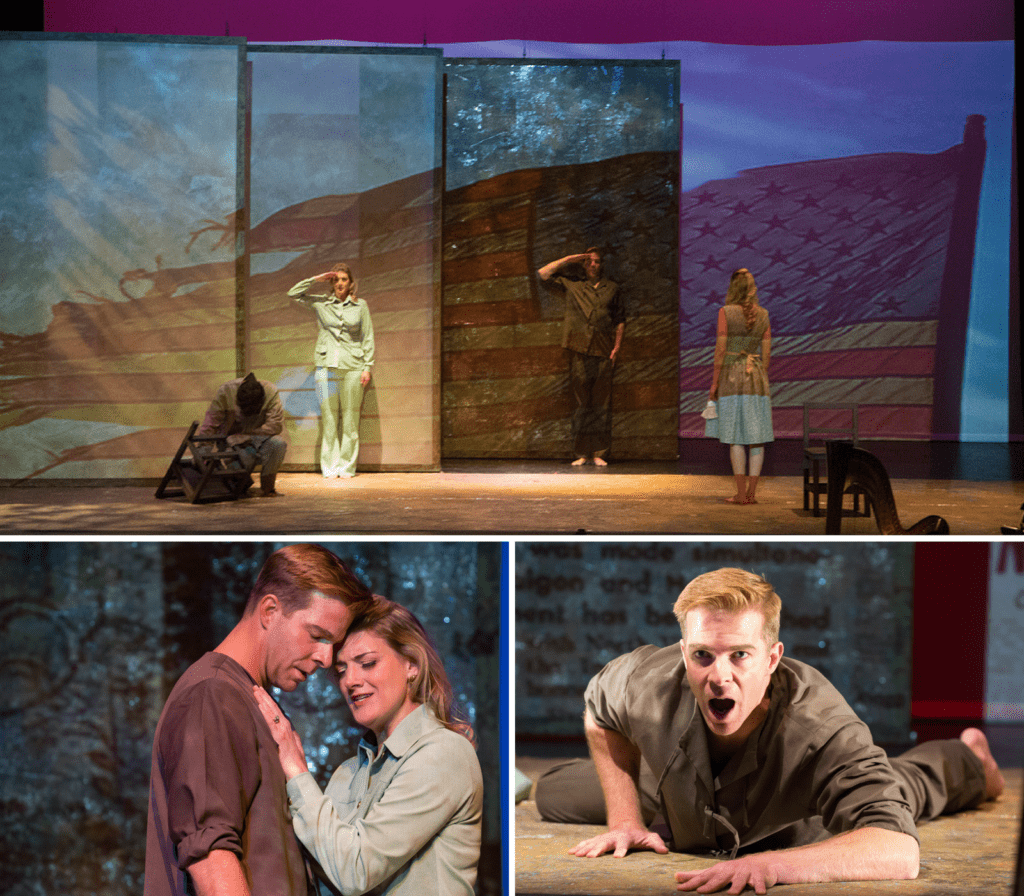
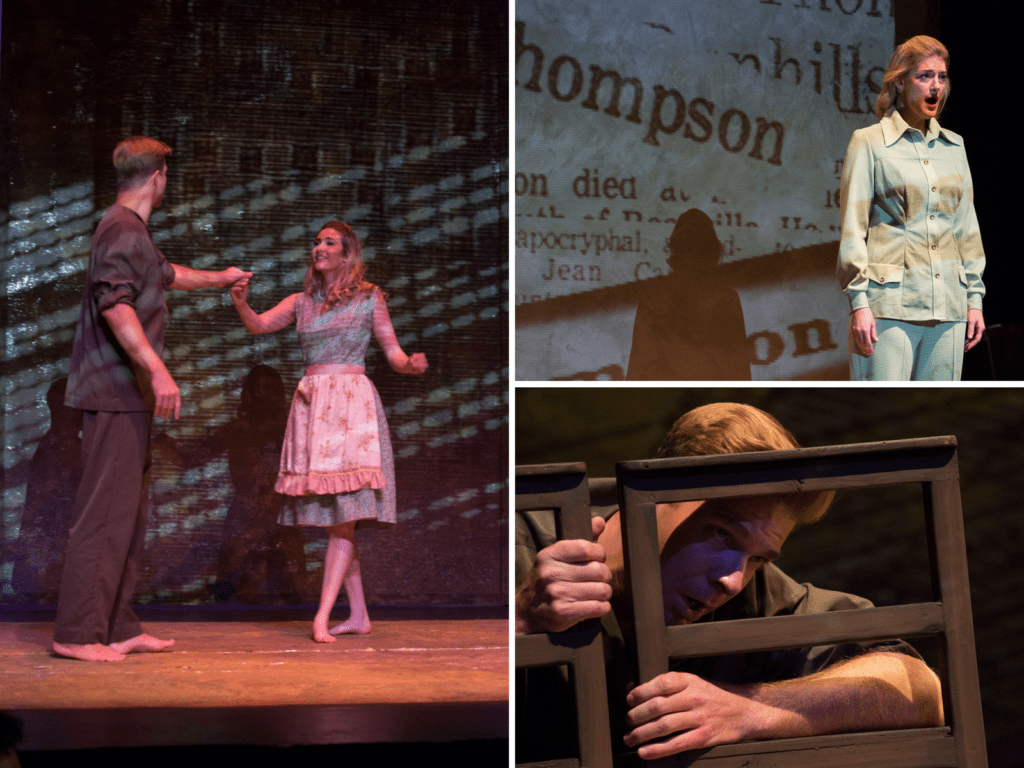
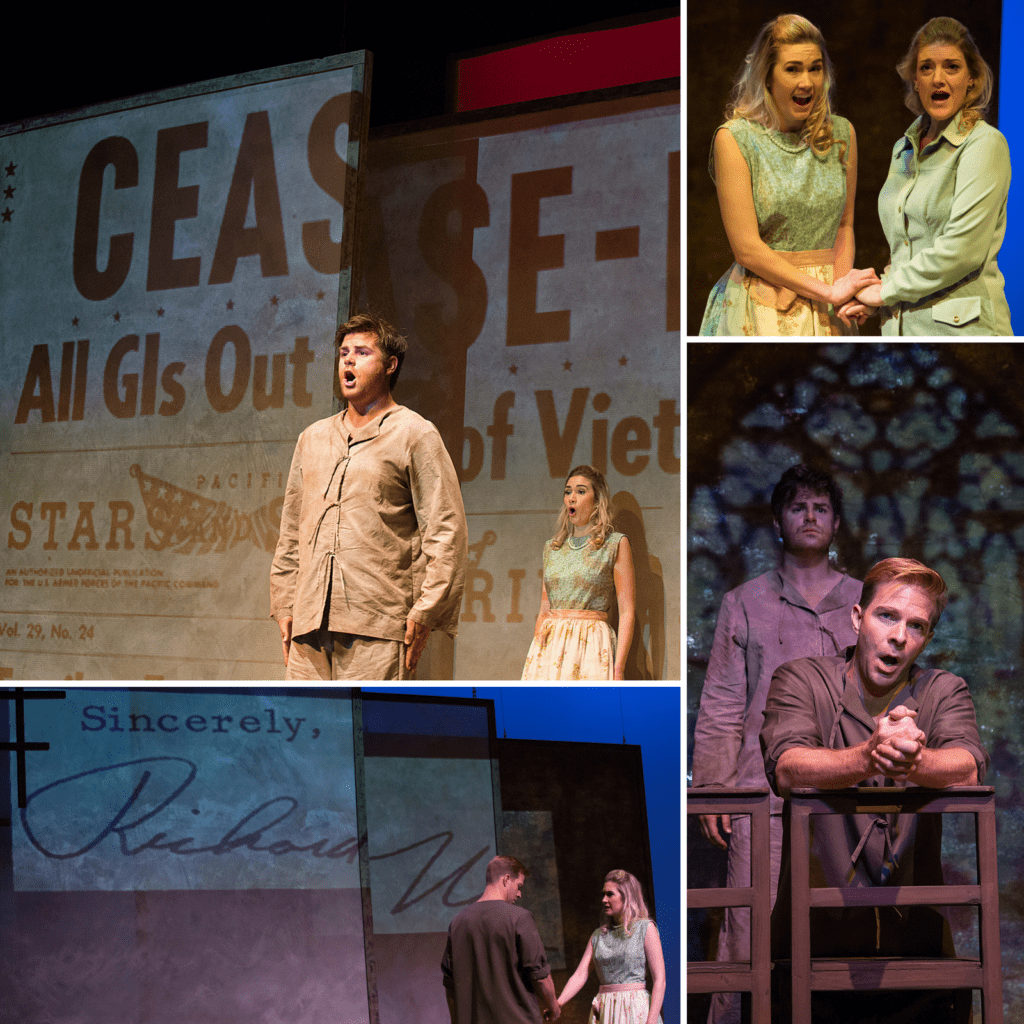
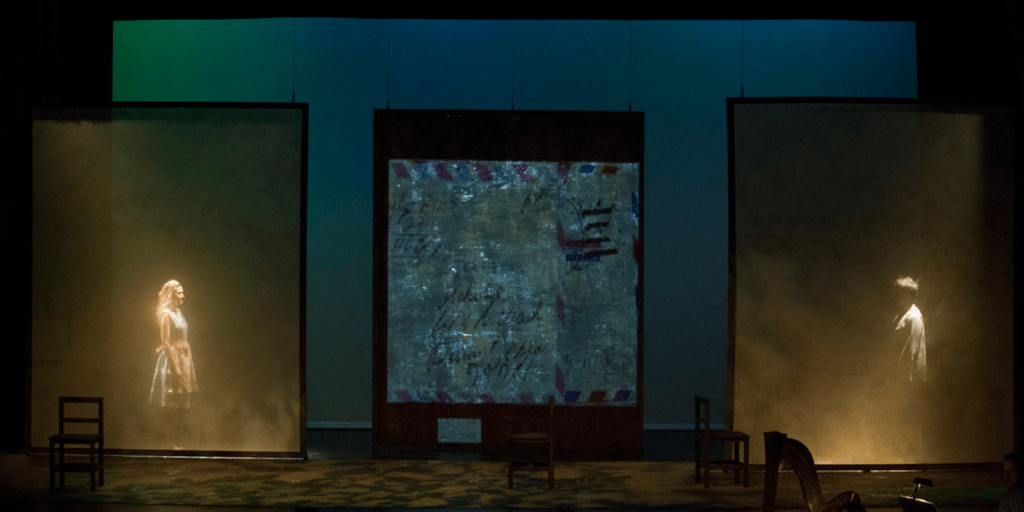
Anchorage Opera 2017 production (Kathleen Behnke, photographer)
Performance Dates
Sunday, February 12, 2017 @ 4:00 PM – Sydney Laurence Theatre in the Alaska Center for the Performing Arts
Thursday, February 16, 2017 @ 8:00 PM – Sydney Laurence Theatre in the Alaska Center for the Performing Arts
Saturday, February 18, 2017 @ 8:00 PM – Sydney Laurence Theatre in the Alaska Center for the Performing Arts
In English with English titles
About the Opera

‘Compelling contemporary’: Glory Denied by Tom Cipullo – Anchorage Opera proudly presents the Alaska premiere of this powerful contemporary show honoring those who serve in our military. Based on a book of the same name, with a foreword by Senator John McCain, the dynamic multi-media production relates the poignant true story of Colonel Jim Thompson, America’s longest-held POW (1964-1973), the wrenching agonies faced by his family, and the larger story of a nation divided during the Vietnam era. After being a prisoner for almost a decade, Thompson returns home to find a son he has never met, a wife that has moved on, a country which has forgotten him and a nation that has changed beyond recognition as he struggles to find his bearings in a society he fought to defend. We are proud to bring this socially relevant and important work to our community, so that we may all gain a greater appreciation of the sacrifices made by those who serve in our armed forces.
Glory Denied in reviews
“This is no fictional dialogue…but the real, powerful emotional struggles of two flesh-and-blood human beings caught up in a drama neither one of them wanted or created…a terrifically powerful work, superbly written…”
Lynn René Bayley, Fanfare Magazine Jan/Feb 2014
“…a luminous score that offered vivid embodiments of the protagonist’s mental states.”
Joan Reinthaler, Washington Post April 3, 2011
“…a powerfully realistic thriller and an unabashedly honest commentary on the America of the 1960s and ’70s.”
Edward Brown, Fort Worth Weekly May 1, 2013
“ [an] intimate operatic masterpiece.”
Wayne Lee Gay, D Magazine April 22, 2013
“…a work of our time…It holds its own against the greatest of the classical repertoire, while helping to redefine it at the rarer scale of chamber opera.”
H. Paul Moon, DC Arts Beat April 4, 2011
About the Book & Author
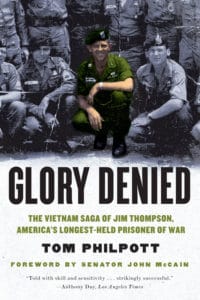 Tom Philpott‘s book, Glory Denied: The Vietnam Saga of Jim Thompson, America’s Longest-Held POW, was reissued in paperback in Memorial Day 2012 by W.W. Norton. The book was excerpted in New Yorker magazine and has been made into an acclaimed opera by composer Tom Cipullo. In his foreword to the book, Senator John McCain writes, “Before Vietnam, the truth of war, of honor and courage, was obscure to many of us. Like Jim Thompson, I learned the truth in war. Like Jim, I discovered in Vietnam that faith in myself proved to be the least formidable strength I possessed when confronting organized inhumanity on a greater scale than I conceived possible. In prison, I learned that faith in myself alone was ultimately no match for the cruelty that human beings could devise when they where unencumbered by respect for the God-given dignity of man. This is the lesson many Americans, including Jim, learned in prison. It is, perhaps, the most important lesson we have ever learned. Jim Thompson kept the faith. This is his story.”
Tom Philpott‘s book, Glory Denied: The Vietnam Saga of Jim Thompson, America’s Longest-Held POW, was reissued in paperback in Memorial Day 2012 by W.W. Norton. The book was excerpted in New Yorker magazine and has been made into an acclaimed opera by composer Tom Cipullo. In his foreword to the book, Senator John McCain writes, “Before Vietnam, the truth of war, of honor and courage, was obscure to many of us. Like Jim Thompson, I learned the truth in war. Like Jim, I discovered in Vietnam that faith in myself proved to be the least formidable strength I possessed when confronting organized inhumanity on a greater scale than I conceived possible. In prison, I learned that faith in myself alone was ultimately no match for the cruelty that human beings could devise when they where unencumbered by respect for the God-given dignity of man. This is the lesson many Americans, including Jim, learned in prison. It is, perhaps, the most important lesson we have ever learned. Jim Thompson kept the faith. This is his story.”
Tom Philpott, syndicated columnist and freelance writer, has covered the military for more than 30 years. His weekly news column, Military Update, has appeared in daily newspapers across the U.S. and overseas since 1994. His freelance articles have appeared in numerous magazines including The New Yorker, Washingtonian, Readers’ Digest and Kiplinger’s.
Military Update, which reaches two million readers, focuses on breaking news affecting pay, benefits and the lifestyle of service people. Philpott also writes a monthly column, Observation Post, for moaa.org and another, Veterans’ Update, for American Legion Magazine. He is a regular contributor to Military Officer’s Magazine and associate editor (U.S. section) for Jane’s Fighting Ships.
Philpott served a tour in the U. S. Coast Guard as an information officer. He was a reporter and editor for Army Times Publishing Co. from 1977 to 1993, including six years as editor of Navy Times. He is a graduate of St. Vincent College, Latrobe, Pa.
About the Composer
 Hailed by the American Academy of Art & Letters for music that displays “inexhaustible imagination, wit, expressive range and originality,” composer Tom Cipullo’s works are performed regularly throughout the United States and with increasing frequency internationally. The winner of a 2012 Guggenheim Fellowship, the 2013 Sylvia Goldstein Award from Copland House, and the 2013 Arts & Letters Award from the American Academy, Mr. Cipullo has received commissions from Music of Remembrance, SongFest, Joy in Singing, the Cecilia Chorus, the New York Festival of Song, the Mirror Visions Ensemble, Sequitur, Cantori New York, tenor Paul Sperry, mezzo-soprano Mary Ann Hart, the Five Boroughs Music Festival, pianist Jeanne Golan, soprano Martha Guth, soprano Hope Hudson, the Walt Whitman Project, baritone Jesse Blumberg, and many others. He has received multiple fellowships from Yaddo, the MacDowell Colony, and the Virginia Center for the Creative Arts, and awards from the Liguria Study Center (Bogliasco, Italy), the Fundacion Valparaiso (Spain), the Oberpfaelzer Kuenstlerhaus (Bavaria), and ASCAP. The New York Times has called his music “intriguing and unconventional,” and The Pittsburgh Post-Gazette has called him “an expert in writing for the voice.” Other honors include the Minneapolis Pops New Orchestral Repertoire Award (2009) for ‘Sparkler’, the National Association of Teachers of Singing Art Song Award (2008) for the song-cycle ‘Of a Certain Age’, and the Phyllis Wattis Prize for song composition from the San Francisco Song Festival for ‘Drifts & Shadows’ (2006).
Hailed by the American Academy of Art & Letters for music that displays “inexhaustible imagination, wit, expressive range and originality,” composer Tom Cipullo’s works are performed regularly throughout the United States and with increasing frequency internationally. The winner of a 2012 Guggenheim Fellowship, the 2013 Sylvia Goldstein Award from Copland House, and the 2013 Arts & Letters Award from the American Academy, Mr. Cipullo has received commissions from Music of Remembrance, SongFest, Joy in Singing, the Cecilia Chorus, the New York Festival of Song, the Mirror Visions Ensemble, Sequitur, Cantori New York, tenor Paul Sperry, mezzo-soprano Mary Ann Hart, the Five Boroughs Music Festival, pianist Jeanne Golan, soprano Martha Guth, soprano Hope Hudson, the Walt Whitman Project, baritone Jesse Blumberg, and many others. He has received multiple fellowships from Yaddo, the MacDowell Colony, and the Virginia Center for the Creative Arts, and awards from the Liguria Study Center (Bogliasco, Italy), the Fundacion Valparaiso (Spain), the Oberpfaelzer Kuenstlerhaus (Bavaria), and ASCAP. The New York Times has called his music “intriguing and unconventional,” and The Pittsburgh Post-Gazette has called him “an expert in writing for the voice.” Other honors include the Minneapolis Pops New Orchestral Repertoire Award (2009) for ‘Sparkler’, the National Association of Teachers of Singing Art Song Award (2008) for the song-cycle ‘Of a Certain Age’, and the Phyllis Wattis Prize for song composition from the San Francisco Song Festival for ‘Drifts & Shadows’ (2006).
A Note on Glory Denied by Tom Cipullo – August 2001
“Glory Denied may be the first opera adapted from an oral history. As such, it presents no linear narrative. Rather, it jumps from moment to moment, as a man’s mind might leap when subjected to horrific stress. Virtually all of the dialogue in the opera is taken literally from actual statements by the real people involved. On those few occasions where, for dramatic purposes, words have been changed or statements conflated, the composer has taken care not to alter the intent of the speaker.
Based on a book by Tom Philpott, this opera tells the true story of Colonel Jim Thompson, America’s longest-held prisoner of war. The story deals not only with Thompson’s suffering in the jungle of southeast Asia, but also the tragic aftermath that followed his liberation. It is, above all, the story of an American family during one our nation’s most turbulent eras. In its review of Mr. Philpott’s book, The New York Times stated”: ‘Indeed it is not too much to say that Glory Denied and Colonel Thompson’s mixed feelings about it encapsulate something of the moral essence of the Vietnam War and the imperishable bitterness of its legacy.’
For more info on composer Tom Cipullo CLICK HERE
Stage Director Concept

“Glory Denied Artistic Statement and Approach” by Helena Binder
My first step as director in conceptualizing a staging of Glory Denied was to read Tom Philpott’s extraordinary book about the longest held P.O.W. in American history upon which the opera is based. Rather than a linear, narrated story, the book is an oral history of Captain Floyd James Thompson’s nine year captivity during the Vietnam conflict and his eventual and difficult repatriation. The opera, like the book, presents many voices, including Thompson himself, his wife Alyce, his four children, his fellow soldiers, his commanding officers, his friends and his parents, even the Viet Cong captors themselves, all recalling past events, coloring them with personal perspective. And yet in his masterful opera, Tom Cipullo attributes these voices (even Richard Nixon makes a brief appearance) to only four singers: Older Thompson, Younger Thompson, Older Alyce and Younger Alyce. The composer’s non-linear use of the text, jumping back and forth in time with the juxtaposition of voices, and musically; the use of dissonance followed by melodic lyricism, felt to me to evoke a dream; to be taking place inside the Captain’s head. I therefore was convinced to take a less literal, realistic approach and to explore a more abstract presentation of Thompson’s journey.
It is often thought that the various people in our dreams reflect different aspects of the self. It therefore mattered less to me who was saying the words of the libretto than what words were being said. This, and my decision that it was all taking place in the psyche, proved to be very freeing and allowed me to approach the material in a surreal way. Captain Thompson is a kind of Everyman; the Alyces represent not only all families and loved ones who must endure the tribulations of war but the judging public as well; and I felt that the universal struggle to define what makes a hero was a more compelling story than that of one man in one war.
In service to this concept I envisioned a series of large moving panels which could reconfigure, depending on the scene, erase and reveal characters in a sort of shell game, and could host projections that would cue and heighten the emotional content of what is being sung. Rather than these projections being just historical images and documentation, Scott Holdredge, the scenic designer, and I turned to artwork created by American and Vietnamese veterans of the war in Southeast Asia. I was amazed at the wealth of painting, drawing and sculpture, much of which accompanied by the artists’ own written recollections, that was available and meaningful. “Mekong Diaries – Viet Cong Drawings & Stories 1964 – 1975” by Sherry Buchanan, “A Different War – Vietnam in Art” by Lucy R. Lippard and “Vietnam – Reflexes and Reflections” from the National Vietnam Veterans Art Museum were our main sources, providing images of color, emotional context and background. Three wooden chairs are our only furniture thus eschewing a “period” setting for a more timeless one.
The color green was referenced again and again in my reading, in looking at artwork and in talking with veterans. The “big green machine” of the army, the intense green of the Vietnamese landscape, the dark green of the jungle, the green of uniforms, even the green of moldy bread made it clear to me that the four characters should be dressed in verdant shades. The Older and Younger Thompson are in green prison pajamas, the Older Thompson’s new and crisp as an officer’s uniform; the Younger, distressed and covered with the dirt and blood of captivity; the Younger Alyce in a grassy green dress symbolizing the perfect wife of the early 60’s, and the Older Alyce in a mint pantsuit, reflecting the liberated woman as well as the considerable social changes that Captain Thompson found on his return. Each of the four is a prisoner, whether of an enemy, of guilt, of convention, or of the expectations of another, and so they all are barefoot, symbolizing their vulnerability and lack of control.
My goal in the staging was to be very physical, in some scenes almost in an exaggerated way, as in a dream. The four characters struggle with each other emotionally, but physically as well, sometimes violently, as the Older Thompson struggles within himself to come to terms with all that has happened. The lighted panels allow characters to appear and disappear, creating the feeling of memory, both fleeting and haunting. The four singers move the panels and chairs about to create the images that convey their thoughts and feelings as well as the relevant locations. As we often attempt to reimagine and redefine the events of our lives, I hope to convey the story’s relevance to not only the Vietnam generation, but those before and since.
For more info on Stage Director, Helena Binder CLICK HERE
The Cast
Production Team

Hair & Make-up Designer –
Elle Janecek
Emily Butzi
Synopsis
Act I
Captain Thompson (Jim), America’s longest-held prisoner of war, recalls episodes of his nine-year ordeal which include escape attempts, torture, the overwhelming loneliness of five years in solitary confinement, and being forced to sign a propaganda statement. He finds the strength to survive in memories of his family, letters from his wife Alyce about their home and children, and thoughts of his elaborate plans to build his dream house.
Pregnant with their fourth child and only son, Alyce receives the news that Jim’s plane has been shot down. Denied any reliable information about his status or whereabouts, she soon begins a relationship with another man (Harold), eventually moving with him to Massachusetts and telling her children that their father is dead. Alyce refuses to have Jim’s name released to the public as Missing in Action, or inscribed on a P.O.W. bracelet, a popular solidarity symbol at the time, and consults a lawyer in an effort to have her husband legally declared dead. Thompson, in captivity, finds comfort in the 23rd Psalm.
Act II
A number of American P.O.W.s are released and Jim returns home, but the Pentagon honors another man, Everett Alvarez, as the longest-held prisoner. With the signing of the Paris Peace Accords, Jim receives a letter welcoming him back from President Richard Nixon, and suggesting that “some things about America may appear to have changed” since his departure. Alyce greets Jim’s homecoming and confesses her new relationship. She offers to go away if that is what he prefers, but Jim wants to reconcile. He notes how life has changed during his nine year captivity and soon the couple begins to fight with Jim complaining that Alyce is not the wife he left behind. Alyce asserts her independence and describes what her life has been like during his absence. Jim, considered a local hero, is asked to give a sermon at the church where he and Alyce were married, and recalls his idealized family life. But Alyce has moved on.
The years pass and Jim, having suffered a stroke, lives alone, estranged from his family, struggling with all that has occurred.
Free Pre-Opera Talks
 Plan to join us one hour before each performance of Glory Denied to learn the fascinating history and insights into Cipullo’s poignant and compelling opera.
Plan to join us one hour before each performance of Glory Denied to learn the fascinating history and insights into Cipullo’s poignant and compelling opera.
Friday, Feb 10 at 7:00 pm in the Sidney Laurence Theatre
Sunday, Feb 12 at 3:00 pm in the Sidney Laurence Theatre
Thursday, Feb 16 at 7:00 pm in the Sidney Laurence Theatre
Saturday, Feb 18 at 7:00 PM in the Sidney Laurence Theatre







